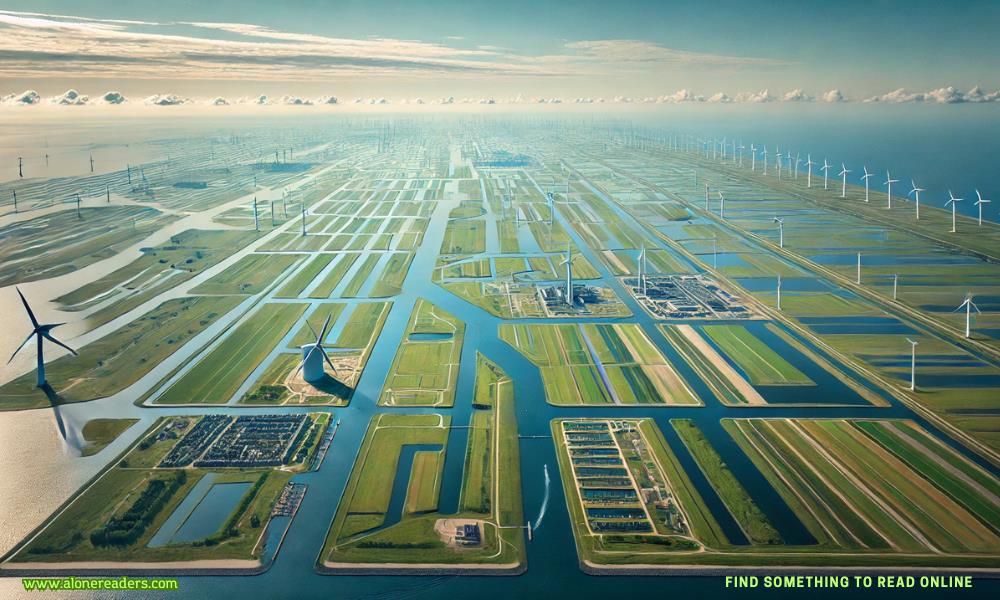
Flevopolder stands as a monumental achievement in Dutch engineering and land reclamation, proudly holding the title of the world's largest artificial island. Spanning an impressive 970 square kilometers, this vast expanse of land is situated in the province of Flevoland in the Netherlands. The creation of Flevopolder is a testament to the Netherlands' longstanding battle against the sea, showcasing innovative techniques and unwavering determination to expand habitable and arable land.
The history of Flevopolder is deeply intertwined with the Netherlands' ambitious Zuiderzee Works, a massive hydraulic engineering project initiated in the mid-20th century. The Zuiderzee, a shallow bay of the North Sea, was transformed into the IJsselmeer, a freshwater lake, through the construction of the Afsluitdijk, a 32-kilometer-long dike completed in 1932. This monumental barrier not only protected the inland areas from the sea but also paved the way for the reclamation of land that would eventually become Flevopolder.
Construction of Flevopolder began in the 1950s and continued for several decades, involving the creation of polders—tracts of land reclaimed from the water by building dikes and draining the enclosed areas. The process required the synchronization of engineering prowess, environmental management, and community planning. The land was systematically drained and fortified against potential flooding, ensuring its stability and suitability for development. The completion of Flevopolder in the late 1960s marked a significant milestone, adding vast areas of fertile land to the Netherlands and facilitating the growth of new cities and agricultural zones.
One of the most remarkable aspects of Flevopolder is its design and layout, which reflect a harmonious blend of functionality and aesthetics. The island is meticulously planned, featuring a network of canals, lakes, and green spaces that not only enhance its beauty but also support water management and biodiversity. The presence of numerous water bodies plays a crucial role in maintaining the ecological balance, providing habitats for various species of flora and fauna, and offering recreational opportunities for residents and visitors alike.
Flevopolder is home to several thriving towns and cities, each contributing to the region's dynamic economy and vibrant culture. Almere, the largest city on the island, exemplifies modern urban development with its innovative architecture, extensive green areas, and comprehensive infrastructure. Almere has grown rapidly since its inception, attracting a diverse population and fostering a strong sense of community. Other notable municipalities, such as Lelystad and Dronten, also showcase the successful integration of residential, commercial, and industrial zones, making Flevopolder a model of sustainable and planned urban growth.
Agriculture plays a vital role in the economy of Flevopolder, benefiting from the fertile soils created through land reclamation. The region is a major producer of various crops, including potatoes, sugar beets, and vegetables, contributing significantly to the Netherlands' status as a leading agricultural exporter. Advanced farming techniques and innovative practices are widely adopted here, ensuring high yields and sustainable production. The agricultural success of Flevopolder not only supports local communities but also reinforces the Netherlands' reputation for excellence in agricultural engineering and management.
Environmental sustainability is a key focus in the development and maintenance of Flevopolder. Efforts are continuously made to preserve and enhance the natural ecosystems, ensuring that the artificial island remains a haven for wildlife and a pleasant environment for its inhabitants. Sustainable water management practices are implemented to protect against flooding and to maintain the quality of water bodies. Additionally, renewable energy sources, such as wind and solar power, are increasingly integrated into the region's infrastructure, reducing its carbon footprint and promoting eco-friendly living.
Transportation infrastructure on Flevopolder is well-developed, facilitating efficient movement of people and goods across the island and to the rest of the Netherlands. A comprehensive network of roads, railways, and waterways ensures connectivity between the various towns and cities, as well as with major urban centers like Amsterdam and Rotterdam. Public transportation options, including buses and trains, are widely accessible, promoting sustainable mobility and reducing traffic congestion. The strategic location of Flevopolder also makes it a key logistical hub, supporting both domestic and international trade.
Cultural and recreational amenities abound on Flevopolder, enriching the lives of its residents and attracting visitors from afar. Museums, theaters, sports facilities, and parks are integral parts of the community, fostering a vibrant cultural scene and promoting active lifestyles. The island's unique landscape, characterized by its lakes and green spaces, offers ample opportunities for outdoor activities such as boating, cycling, and hiking. Events and festivals celebrating Dutch heritage and modern innovations are regularly held, reinforcing the island's cultural identity and community spirit.
Education and research are also prominent in Flevopolder, with institutions dedicated to advancing knowledge and fostering innovation. Schools, colleges, and research centers collaborate to drive progress in various fields, including environmental science, engineering, and sustainable agriculture. These institutions not only educate the next generation but also contribute to the continuous improvement and development of the region, ensuring that Flevopolder remains at the forefront of technological and scientific advancements.
The success of Flevopolder has had a profound impact on the Netherlands' approach to land use and water management. It serves as a model for other countries facing similar challenges of limited land and rising sea levels, demonstrating that with ingenuity and resilience, significant land reclamation projects are achievable. The lessons learned from Flevopolder's development continue to inform contemporary projects, emphasizing the importance of sustainable practices, community involvement, and forward-thinking planning.
In conclusion, Flevopolder is not merely the world's largest artificial island; it is a symbol of human ingenuity and the Dutch mastery of water management. Its creation has transformed the landscape, providing valuable land for habitation, agriculture, and industry, while maintaining a strong commitment to environmental sustainability and quality of life. As the Netherlands continues to navigate the challenges of the future, Flevopolder stands as a beacon of what can be accomplished through dedication, expertise, and a harmonious relationship with nature.